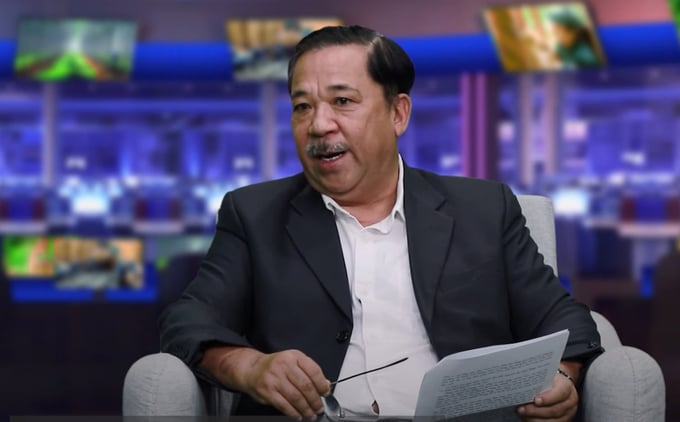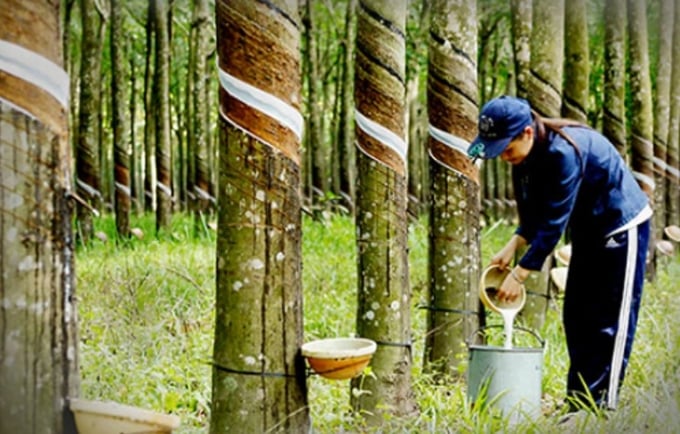June 20, 2025 | 15:02 GMT +7
June 20, 2025 | 15:02 GMT +7
Hotline: 0913.378.918
June 20, 2025 | 15:02 GMT +7
Hotline: 0913.378.918

Mr. Huynh Tan Sieu, the Head of the Industry Department of Vietnam Rubber Group.
In 2019, VRG issued a sustainable forest management program for the 2010-2024. The program was quickly implemented in many member companies, bringing positive results.
By September 2023, Vietnam Rubber Industry Group will have 30 member companies building a sustainable forest management plan on nearly 275 thousand hectares, reaching 95% of the Group's site.
Eighteen member companies of the Group were certified for sustainable forest management according to VFCS/PEFC, with more than 113 thousand hectares of rubber, reaching 83% of the plan. Of these, nine companies achieved 100% certified area.
Thirty-seven factories processing natural rubber, wood processing, and rubber industrial products processing have been granted certificates of product chain of custody management according to PEFC-CoC international standards.
"Those results are an important basis for VRG and its members to embark on implementing the green growth and sustainable development strategy that the Group just issued in September this year," Mr. Huynh Tan Sieu, Head of the Industry Department, VRG, said.
Recently, the world's largest rubber-growing country - Thailand - issued incentives for rubber farmers to exploit carbon credits. According to Mr. Sieu, Thailand's policies both create advantages and pose challenges for VRG.
According to a VRG representative, the Group has about 400,000 hectares planted in 3 Indochina countries: Vietnam, Laos, and Cambodia. Growing areas in many places can help VRG exploit carbon credits significantly.
In addition, the government has issued a roadmap until 2027, focusing on building a legal framework for the carbon credit market. By 2028, this market will operate effectively. "Our Group is in the process of green construction and sustainable development. Therefore, carbon credits are exciting to VRG," Mr. Sieu added.
In the coming time, VRG will focus on research on carbon credits of rubber. Because rubber trees are better at absorbing carbon than other forest crops, VRG is committed to collaborating with scientists to research the Group's carbon credit potential.

In 2019, VRG issued a sustainable forest management program for the 2010-2024. Photo: VRG.
Recently, VRG welcomed many foreign delegations interested in carbon credits and planning to do carbon credit business, mainly from Japan. Therefore, VRG will have activities to promote, advertise, and introduce carbon credits. "Maybe we will trade carbon credits earlier than the 2028 deadline set by the government," Mr. Sieu commented.
Agreeing with Mr. Sieu, Mr. Pham Anh, Deputy General Director of Binh Long Rubber One Member Company Limited, said the carbon credit market has excellent potential. Therefore, rubber companies need direction right now.
As for Binh Long's Company, Mr. Anh said that the Company will increase circular production. Currently, the Company has reused 70% of treated wastewater for production. The goal by 2024 is to reuse 100% of treated wastewater.
"We are also using 100% treated sludge for production. The result is one of the Company's research projects. In addition, we are researching solutions to use sludge from the industrial park's wastewater system to increase the amount of biological fertilizer for rubber gardens," Mr. Anh said.
Additionally, Mr. Anh believes that rubber companies should produce in a streamlined manner, reducing energy consumption. From production practice, Binh Long Company has rearranged all production lines, cut redundant steps, and reduced machinery and equipment that use a lot of energy.
The Company also reorganized its system of material and chemical suppliers. Suppliers must ensure green and sustainable production according to the process.
"The company will continue to reduce greenhouse gas emissions and implement the Net Zero goal according to VRG's roadmap," Mr. Anh emphasized.
Although Vietnam does not yet operate an official carbon credit market, hundreds of carbon credit projects are being implemented in many regions across the country according to independent international standards.
According to experts, projects that reduce greenhouse gases under the carbon credit mechanism can create potential items to exchange and buy domestically and internationally in the billion-dollar carbon credit market. Many companies dealing in different fields can earn significant income from selling carbon credits.
The basic principle of the carbon market is that the buyer will pay a fee to receive additional credits and emission quotas to achieve emission reduction goals or to make goods eligible for export into strict market regulations on green production standards.
However, a project can only issue carbon certificates and receive payments if it is measured and verified by an independent third party.
Translated by Tuan Huy
/2025/06/17/3942-2-143243_548.jpg)
(VAN) Recently, in Sweden, the Secretary of the Binh Dinh Provincial Party Committee presented the Investment Registration Certificate for the 'Polyester Fabric Recycling Complex' project to SYRE Impact-AB Company.
/2025/06/12/3721-2-202745_83.jpg)
(VAN) TH made an impression at Seoul Food 2025 with its line of natural beverages, paving the way for Vietnamese food products to enter the South Korean market.

(VAN) Soc Trang's success in rice exports stems from a strategy of developing fragrant and specialty rice cultivation areas and standardizing production toward low-emission practices.
/2025/06/11/1311-5-120811_839.jpg)
(VAN) The pig farming industry is facing the challenge of comprehensive restructuring to meet requirements for quality, safety, traceability, and market expansion both domestically and for export.

(VAN) Vietnam considers participating in ALGROALBA in order to expand agricultural production, coordinate the assessment and effective exploitation potential land.
/2025/06/05/5314-1-184727_407.jpg)
(VAN) From seemingly worthless fish scales and skin, enzymes and lactic ferments can transform by-products into peptides, opening a sustainable, effective business direction and elevating Vietnamese seafood.

(VAN) TTC AgriS and IFC signed a strategic partnership to develop a sustainable agricultural value chain, aiming to achieve the Net Zero target by 2035.